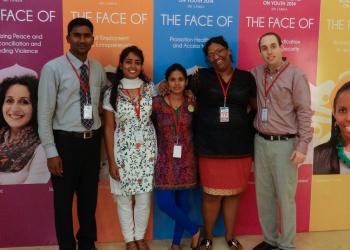Which Youth, Whose Development? Reflections on the World Conference on Youth 2014
The idea was to hold a conference drawing youth leaders from around the world, an event seeking to strengthen the voice of young people in the global development agenda, a meeting offering opportunities to contribute perspectives and learn from almost 2,000 peers.
In that respect, the World Conference on Youth (WCY) succeeded. Held in Colombo, Sri Lanka, in early May, the Conference was a source of tremendous energy and excitement. Yet it also raised profound questions.
How, for example, does influencing a global agenda relate to effecting change at the local level? How can one best read local realities in the face of larger, international trends?? If development is to be truly universal, what is the relationship between youth who enjoy the opportunity to attend an international conference, and youth who do not?
As the Bahá'í International Community’s delegation sought to negotiate these questions within the very practical context of planning a side event at the Conference, we tried to avoid artificially prejudging young people’s potential sphere of contribution. (View video interview with one youth delegate.) Youth might well contribute to social progress by participating in the structures of government or volunteering their time and capacities to development agencies or other civil society groups. At the same time, we believe that no individual is dependent on external organizations to better his or her community. In other words, it is not necessary for anyone to wait for the direction of others to begin working for the common good. (View story covering this event.)
In this light, the contribution to the Conference was based on the principle that all youth, whatever their background or access to structures of power, have the capacity to making a difference in their own social spaces and circles – and that this is a profound and often overlooked source of global development. As our statement noted:
…the paths open to the youth of the world for selfless service to others are numerous.
Few of these opportunities are found at the highest levels of global governance, such as the conference that has drawn us together today. Most are less formal and closer to home, but equally important. In partnering with other youth and like-minded adults, for example, we play a powerful role in catalyzing home-grown transformation and progress. We make similarly unique contributions in the development of upcoming generations, providing those younger than ourselves with a model of conduct to emulate and a trusted partner in developing personal capacities and exploring how those talents might be dedicated to the well-being of the community. Put simply, our generation is a vibrant source of social advancement in a variety of contexts, ranging from the village square to the global stage.
These ideas took on more concrete form when we realized that our side event – which focused on the theme of empowerment and capacity-building – need not be confined only to official conference delegates, who faced a daunting schedule of official activities. We realized we could also reach out to the 500 Sri Lankan volunteers providing a range of support services for the conference – youth who were already demonstrating that spirit of selfless service to others so often extolled in discussions of community development.
Some twenty of these volunteers came to our first workshop and provided numerous observations and rich insights. But their involvement did not end there. Seeing the potential benefit of delving into issues of empowerment while incorporating the arts, the volunteers, of their own volition, worked with us to organize a second session. That session drew more than 40 members of the Sri Lankan National Youth Parliament, while the volunteers – everyday people who had expected only to play support roles at a major international conference – now served as facilitators, steering small group conversations and guiding discussion in new ways they might not have imagined before.
What was exciting here was that the very principle we were trying to discuss – the idea that all people matter, all can be empowered to act – came to life right in front of our eyes. Not because of anything we did that was special, but because all are capable and all desire the opportunity to contribute to society.
For those of us working at the international level, it can be easy to focus on formal systems, structures, and agencies as well as those individuals who have the resources or connections to plug into them. But global development based on the paradigm of a select few providing for the well-being of all the rest seems dubious at best. It seems daily more apparent that universal development will require universal participation.
In this light, I am reminded of the words of a young man from Kenya, who attended a conference last year that was similar in spirit to the World Conference on Youth. He shared the following thoughts on the contribution youth can make to the progress and betterment of their communities:
“I have always liked the idea of service but I thought it was something done by people who had money or resources. I come from a village of very many people; I cannot feed or clothe them — that is what I always thought. Being at the conference has, however, opened my mind to the fact that service extends to more than just giving material possessions; I have energy, time, and some basic skills which I will now use to be of benefit to my community.”
– by Daniel Perell, Representative of the Baha’i International Community to the United Nations
